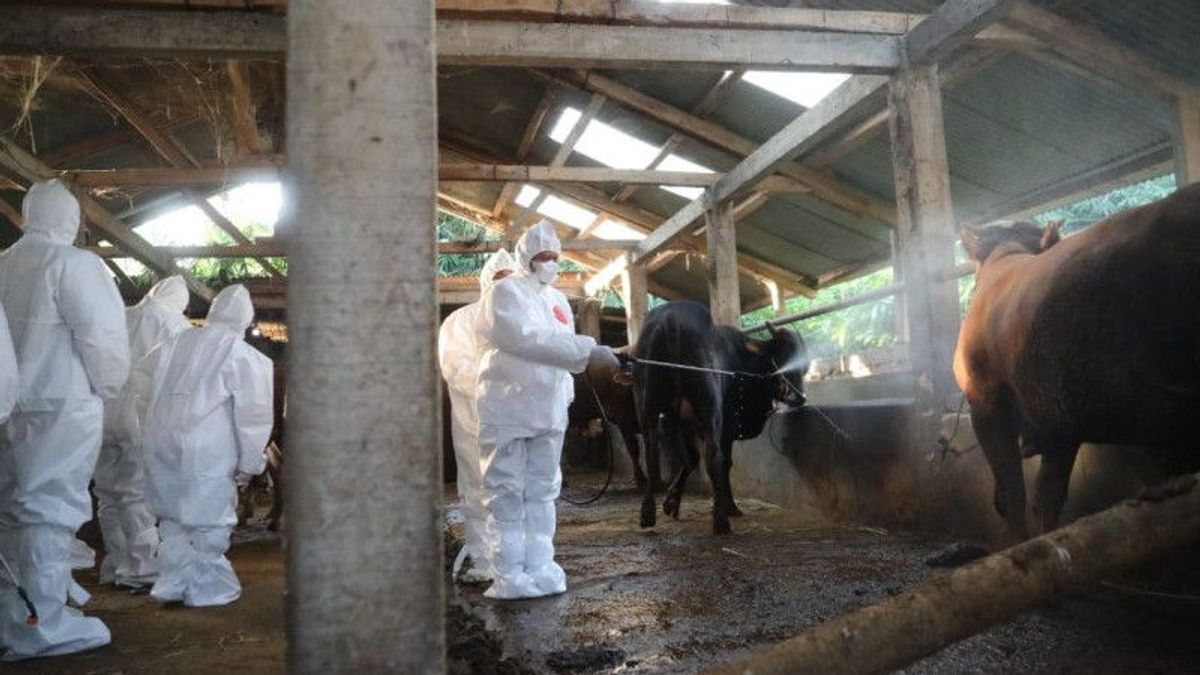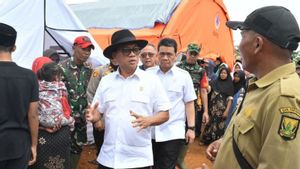JAKARTA - The Research and Development Agency (Balitbang) of the Ministry of Agriculture recommends that farmers tighten the cultivation of livestock with biosecurity to prevent the transmission of foot and mouth disease (FMD) in healthy animals.
The Head of Research Center for Beef Cattle Research and Development of the Ministry of Agriculture, Dicky M. Dikman, said that efforts to cultivate cattle, starting from maintenance management to health management, can prevent livestock from contracting FMD.
"Basically, cultivation management is carried out to produce healthy livestock. It's just that there is special treatment during this FMD outbreak, especially with tightening biosecurity," said Dikman as quoted from Antara, Saturday, May 28.
He explained that the pattern of maintenance can be done intensively, semi-intensively, and extensively.
However, livestock cultivation in FMD outbreak areas is recommended to apply an intensive pattern, namely by keeping livestock in cages and providing food and drinking water needs.
"For outbreak areas, we are directing an intensive system to reduce the risk of airborne transmission. The feed provided can be in the form of forage and concentrates that are tailored to the needs and production," said Dikman.
According to Dikman, the cultivation can be tightened with biosecurity as an effort to prevent the spread of PMK.
Biosecurity is all physical and management efforts to minimize the risk of disease agents entering the farm, preventing the development of disease, and preventing the release of disease agents from the farm.
"Biosecurity is vital, either by smallholder farms or private company farms. For housing, we are tightening personnel going in and out of the cage. Visits of guests or other visits are also closed until the epidemic subsides," said Dikman.
He explained, an example of the implementation of biosecurity at the Beef Cattle Research Workshop, Pasuruan, East Java, namely the implementation of a one-door system and set a red zone, a yellow zone, and a green zone in the enclosure.
"The red zone is at the front of the security post, which is where disease agents are free to thrive due to high community traffic. The yellow zone is in the middle of the office, which is an area equipped with biosecurity for officers who will enter the cage. The green zone is equipped with disinfectant spray to enter the cage. the cage area must be sterile," said Dikman.
Some of the facilities provided include disinfectant spray for entering and exiting vehicles, sanitation equipment for cage workers such as lockers, bathrooms and showers, spraying booths for officers, and cage sanitation.
Another effort that needs to be done is spraying insecticides to kill insects, flies, and other pests around the cattle pens. This is done to keep the cage environment clean and prevent the spread of disease.
Dikman explained that sick cattle must be treated immediately. Meanwhile, livestock carcasses that died due to PMK must be burned or buried immediately.
"Infected cattle are slaughtered and disposed of infected tissue. Infected feet are treated with chloramphenicol or cuprisulfate solution. Intravenous injection of sulfadimidine preparations is also considered effective against FMD," said Dikman.
Dikman emphasized that the important thing that needs to be done is evaluating the management of cattle breeding and increasing awareness of the surrounding environment.
"My advice, breeders must be aware and alert to the surrounding environment, always build communication with relevant agencies, BB Veterinary officers, or the Directorate General of Livestock and Animal Health (PKH) to update information on the latest developments from the PMK outbreak," he said.
FMD is an infectious disease that attacks split-hoofed animals such as cattle, buffalo, camels, elephants, deer, goats, sheep and pigs. This disease causes blisters on the tongue, gums, nose, and nails of infected animals.
The English, Chinese, Japanese, Arabic, and French versions are automatically generated by the AI. So there may still be inaccuracies in translating, please always see Indonesian as our main language. (system supported by DigitalSiber.id)








